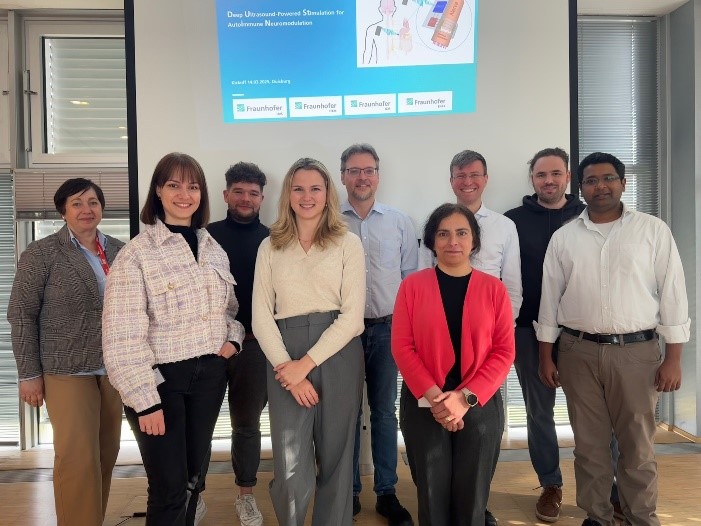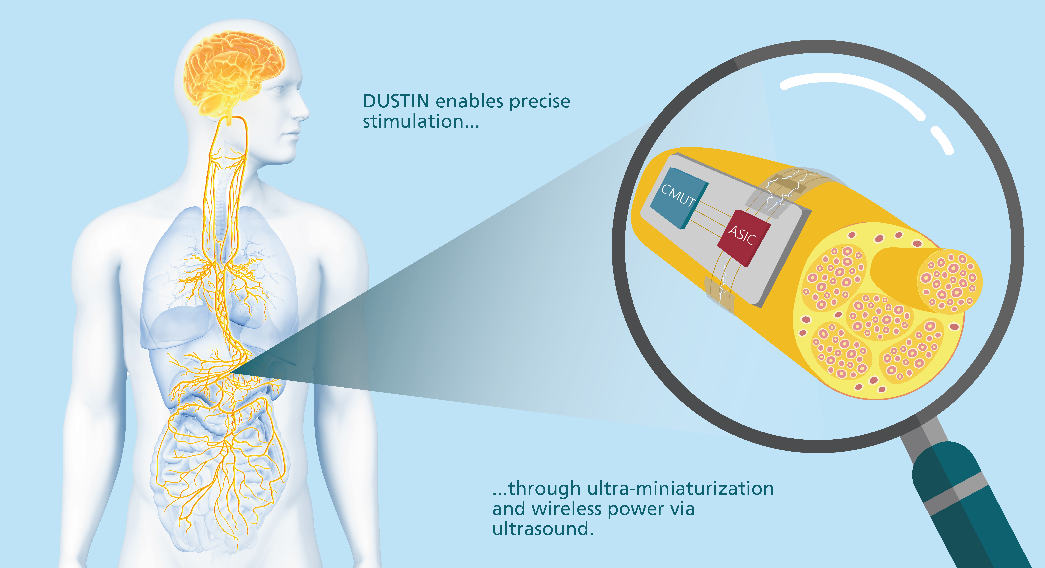PREPARE project DUSTIN launched
Drug-free autoimmune therapy: Fraunhofer drives ahead with selective nerve stimulation
Duisburg, 14th July 2025 – Targeted nerve stimulation instead of drugs: With the kick-off of the PREPARE project DUSTIN, a promising research alliance for the visionary treatment of autoimmune diseases is starting its work. Four Fraunhofer Institutes are pooling their expertise to develop a miniaturized, battery-free implant that communicates and is powered by ultrasound. The project is receiving €3.5 million in funding.


June 2025 marked the kick-off of the Fraunhofer joint project DUSTIN (»Deep Ultrasound powered STimulation for autoImmune Neuromodulation«), which is funded as part of the Fraunhofer PREPARE program. The aim of the interdisciplinary project is to develop a miniaturized, battery-free ultrasound powered implant that can stimulate nerve branches deep within the body, opening up new avenues for the treatment of autoimmune diseases.
The project brings together the expertise of the Fraunhofer Institutes IZM, ITEM, ENAS, and IMS in a strategic alliance. DUSTIN pursues a technology-open approach that breaks through the limits of previous neurostimulative medical technology: While previous systems primarily target larger nerve bundles, DUSTIN aims at high-precision stimulation directly at the target location, made possible by maximum miniaturization and wireless energy supply and data communication via a single ultrasound transducer.
»The vision behind DUSTIN is to enable alternative forms of therapy in which targeted nerve stimulation is more effective and has fewer side effects than conventional drugs,« explains project manager Prof. Karsten Seidl from Fraunhofer IMS. »We are combining our expertise in microchip development, medical technology, and system integration to lay the foundation for future clinical applications. At the same time, we benefit from the know-how of our partner institutes, which are providing crucial building blocks for the novel wireless implant in the form of ultrasound-based transducers, biocompatible packaging, and preclinical validation.«
Four Fraunhofer Institutes are pooling their key competencies
Together, the partners cover the central areas of expertise: from neuroscience and applied microtechnology to electronics development and innovative concepts for wireless energy and data transmission, to test bench development and regulatory compliance and the necessary documentation to enable transfer into application.
As part of DUSTIN, IMS is developing a millimeter-sized microchip with extremely low standby power consumption. This chip will take over the central control of the implant functions: multi-channel stimulation, signal recording, and wireless communication. The chip is complemented by the expertise of the other Fraunhofer Institutes in the project consortium: Fraunhofer ENAS is contributing its proven expertise in the development of microfabricated ultrasonic transducers (MUT) and designing a preloaded CMUT (Capacitive Micromachined Ultrasound Transducer), a particularly compact ultrasonic transducer that transmits energy and data to the implant using just one component. Fraunhofer IZM is developing biocompatible, ultrasound-transparent housing concepts and flexible microelectrodes for the electrical interface with the nerve tissue – crucial for long-term stability and safety. Finally, Fraunhofer ITEM is testing the system in realistic tissue environments (manufactured using bioprinting techniques) and preparing the next steps for medical application.
The medium-term goal is to use DUSTIN to create a nucleus for a comprehensive, cross-institute range of services within the Fraunhofer Group for start-ups, SMEs, and larger companies to develop next-generation neuralimplants. The project will run from March 1, 2025, to February 29, 2028.
About PREPARE
The Fraunhofer PREPARE program (»PREParation for Applied REsearch«) serves to promote strategic research projects with high innovation potential. PREPARE aims to create new technological alliances and address forward-looking topics at an early stage.
DUSTIN is a prime example of the goals of the PREPARE program: cross-institutional, high-risk preliminary research to open up new business areas. The funded projects receive up to €3.5 million in support and are expected to achieve a return on investment in the medium to long term through technological breakthroughs.
Download press release
Fraunhofer IMS
Shaping a safe and sustainable future with intelligent sensor systems: Fraunhofer IMS works on innovative microelectronic solutions with over 200 talented scientific staff and students in numerous state-of-the-art research laboratories.
As a reliable research and development partner for industry, the institute aims to develop customized sensor technology for your specific requirements in the fields of biomedical sensors, optical systems, open-source semiconductors, embedded AI, technology services and even quantum technology. The teams in the four business units - Health, Industry, Mobility and Space and Security - are committed to implementing outstanding and versatile microelectronics in all their projects. These solutions are characterized by high integration capability, enormous energy efficiency and reliable functionality even under harsh conditions.
The Fraunhofer IMS is a cooperating institute in the Research Fab Microelectronics Germany (FMD). In the FMD, 15 research institutes work together under one virtual roof.
www.ims.fraunhofer.de